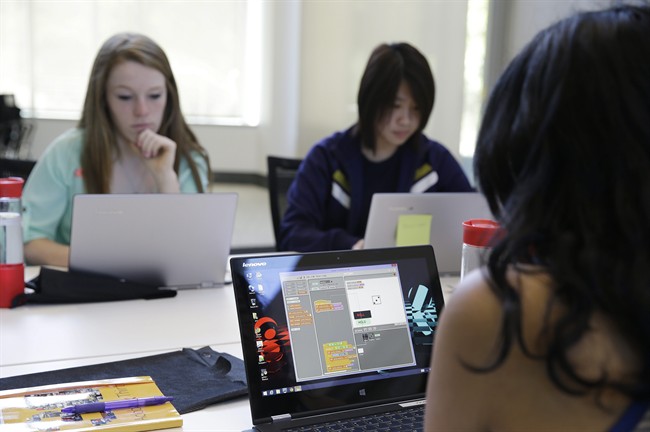TORONTO – When Loretta Faveri decided to go to art school as a mature student, she never imagined she would emerge a budding wearable tech entrepreneur.

With a background in dance and art, Faveri started classes at Toronto’s OCAD University working toward a Bachelor of Design degree. But after getting hands-on with some of the school’s more technical programs and tools, she was inspired to take her art in a new direction.
Faveri is the creator of SOMO – a wireless, wearable sensor that creates sound using a person’s body movements.
The device can be worn on the wrists or feet of dancers to create a unique sound performance. Faveri’s team of engineers and designers at her Toronto-based studio Sonicwear have been testing SOMO with dancers from Canada’s Ballet Jorgen and The Studio for Movement.
“None of this would have happened if I didn’t go to art school,” Faveri told Global News.
“It took me way out of my comfort zone because I don’t have any background in electronics. The only reason I pursed it was because I had a vision. For me it’s about making magic.”
And, at a time where the lack of women working in tech has become a big conversation within the industry, Faveri hopes the idea of making magic is something that will inspire more women and girls to look differently at technology.
Women still represent the majority of university graduates in Canada, however they remain underrepresented in science, technology, engineering, mathematics and computer sciences (STEM) fields.
READ MORE: Women less likely to choose university program in science, tech, engineering, math
According to the 2011 National Household Survey (NHS), women accounted for 39 per cent of university graduates aged 25 to 34 with a STEM degree in 2011, compared with 66 per cent of university graduates in non-STEM programs.
The 2011 survey – the most recent data Statistics Canada has on the topic – also found that among women who choose to pursue a degree in STEM, most do so in biology or science programs, resulting in even fewer women in engineering, computer science and mathematics programs.

The trend is echoed by workforce diversity reports from tech giants like Google and Twitter.
In May, Google revealed only 30 per cent of its global workforce were female. Twitter reinforced the gender gap in July; also reporting only 30 per cent of its workforce is female.
In fact, 30 per cent seems to be the average for tech companies these days – only 33 per cent of Hewlett-Packard’s workforce is female. The computer-maker employs over 331,800 people worldwide.
READ MORE: Inspiring the next generation of women in tech
- Honda expected to announce Ontario EV battery plant, part of a $15B investment
- Trudeau says ‘good luck’ to Saskatchewan premier in carbon price spat
- Canadians more likely to eat food past best-before date. What are the risks?
- Hundreds mourn 16-year-old Halifax homicide victim: ‘The youth are feeling it’
And tech companies know that they need to address the gender gap.
In June, Google launched an initiative called “Made with Code,” a program dedicated to teaching young girls the basics of coding and introducing them to female role models who work in the industry.
The program enforces the idea that tech is synonymous with almost every industry – profiling women who write software to design cool fabrics for fashion, to those who write code to create beautiful Broadway-like light displays.
“When we say ‘tech’ it can sound kind of scary to people – it’s such a broad term. Tech is not this scary word that is all about computer programming and hard math – it can be really accessible and you can approach it from all angles,” said Tutu Ilelaboye, a Toronto-area developer with a background in business.
“I don’t know that people realize they are touched by [tech] no matter what they do.”
READ MORE: Ada Lovelace day aims to inspire women in tech, sciences
Ilelaboye is a perfect example of this. After receiving a business degree, the Winnipeg-native moved to Toronto to pursue a career in marketing. But around 2004, after a few years in the workforce, she noticed more employers asking for marketers who could also help manage website content.
After going back to school to learn a variety of digital skills – from coding, to online publishing and various programs for web and content design – her resume now includes working on Microsoft’s digital marketing team and a variety of developer roles.
“I felt like I had taken my career in a new direction,” she said.
But a career in tech hasn’t been without its hardships; Ilelaboye admits that she has experienced her share of sexism in the industry.
“Overall it’s been a positive experience – now that I think about it I’ve actually worked with and for a lot of women,” she said.
“That being said I have encountered times where I haven’t been taken seriously by men – I hate to say it. You have to prove yourself a little bit more as a women working in tech, before people will take you as seriously as a man in the same role.”
Ilelaboye now hopes to work as a mentor for those who are underrepresented in the industry – not just women, but visible minorities and people with disabilities.
But after working alongside other women in the industry, Ilelaboye said she has hope that more women will take on tech-related roles.
“I think we’ve come a long way – there are a lot of women advocating for women in the industry,” she said. “Perhaps it’s just our time.”






Comments